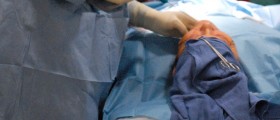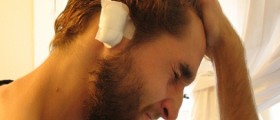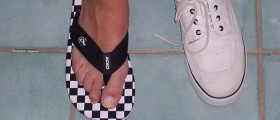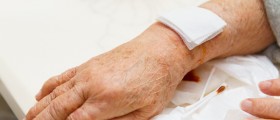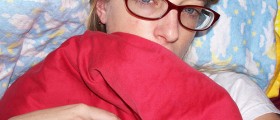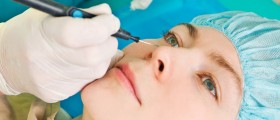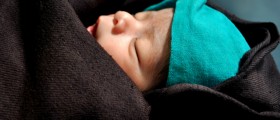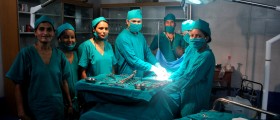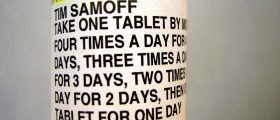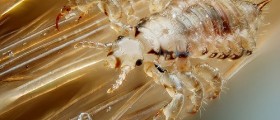I was recently given the steroid dexametasone after brain surgery. I got a I guess ulcer like sore or lesion in my scalp. It itched badly and my hair began to fall out. The area affected is warm to the touch. Could it be caused from a side effect of the steroid?
Loading...
This is an observation, not a prescription. I also had a meningioma removed about a year and a half ago. First, I think the dexamethasone was to suppress swelling of your brain mass in the limiting cranial space due to inflammation. Check that with your surgeon or doctor.
Secondly, the incision through my scalp extended from a point about 2 inches above my eye, in a straight line back toward the rear, then curved like a large "C" to a point down about level just below the upper tip of the ear, then forward over the ear, and then curved around the front of the ear for about 1½ inch straight down. That incision had to be over a foot long. The scalp seems to be a very complex organ of itself. So the cut sliced through a whole lot of nerve centers and blood vessels that took a lot of healing. I not only had sources of irritation and sores all along that incision, as well as at the points where the sutures were anchored either side of the incision.
I also developed sores on areas of the scalp not near the incision line, on the other side of my head. I am inclined to think this was caused by irritation to the whole scalp nerve system, as a secondary effect. I had trouble leaving these spots alone. Right after the discharge from the hospital I was taking dexamethasone, Kepra (anticonvulsant), and metaprolol (a blood pressure controller). The sutures were removed maybe about 2 weeks after discharge. The dexamethasone about a month after discharge, and the anticonvulsant about a month later. So then I was only taking the BP med. It really was not until that time the scalp irritation started bothering me.
At the 3rd month after discharge, another BP med, Diovan HCT was added; and now, 15 months later, these are my daily 2 meds. But at the time I started with the Diovan, the irritations seemed to get worse! I thought it might be the meds causing it. I thought it might be causing seborrheic dermatitis, and I complained to the doctor. He then prescribed fluocinonide anti-itch solution, and told me to cease using any strong antibacterial or antidandruff shampoos. Well, the troublesome phase continued for about another 5 to 6 months, then started to diminish. But now I just think the itchy lesion phase just happened concurrently that the new med was added. I don't believe that for my case there was any causative or aggravation interaction.
I no longer think the meds had anything to do with the problem that you describe and like I experienced. It is just a long period of healing for the scalp. What I think was two factors: (1) that the edges of the incision never match quite perfectly so healing is not instantly; and (2) I think that the both the nerves network and the blood vessels have to find new paths. With the incision if there is a slight protrusion, this might not get circulation. So that area dries up, loses flexibility, and has to be somehow shed. I found I kept fussing with these itchy areas (which didn't help) but the extra dried skin finally sluffed off or was dug off, and the area healed and finally stopped bothering.
Now there are only two places which still seem to be a little bothersome. After looking at the post-operative MRI, I have come to the conclusion that these two last spots are precisely just above where I think the two holes were bored for the bone-saw tip to be inserted, which were areas a bit more disturbed, and are just finally taking a little while longer to finish healing.
But one layman's idea really did work for me. My barber (all barbers used to be surgeons, I'm told) related that his wife had an operation on skin cancer, and they conceived of putting a little hole in the end of a vitamin E softgel, and squeezing out the oily contents to apply to the scars of her incisions -- that it really helped the incisions to heal quickly without fuss. After looking closely at my incision line, he suggested that I try this palliative trick. I did this for these last lesions and dry spots on my scalp, and found that it took away the itchiness and removed some of the dryness, and seem to be healing much better.
That's my opinion. I have a hard-sciences Ph. D. in solid state physical chemistry, but I am certainly _not_ a physician. What you read is just my experience, observations and opinion. The only thing I would say is to avoid fussing with or digging at these sores and itchy spots. It's your brain underneath it. Hope this helps.
Secondly, the incision through my scalp extended from a point about 2 inches above my eye, in a straight line back toward the rear, then curved like a large "C" to a point down about level just below the upper tip of the ear, then forward over the ear, and then curved around the front of the ear for about 1½ inch straight down. That incision had to be over a foot long. The scalp seems to be a very complex organ of itself. So the cut sliced through a whole lot of nerve centers and blood vessels that took a lot of healing. I not only had sources of irritation and sores all along that incision, as well as at the points where the sutures were anchored either side of the incision.
I also developed sores on areas of the scalp not near the incision line, on the other side of my head. I am inclined to think this was caused by irritation to the whole scalp nerve system, as a secondary effect. I had trouble leaving these spots alone. Right after the discharge from the hospital I was taking dexamethasone, Kepra (anticonvulsant), and metaprolol (a blood pressure controller). The sutures were removed maybe about 2 weeks after discharge. The dexamethasone about a month after discharge, and the anticonvulsant about a month later. So then I was only taking the BP med. It really was not until that time the scalp irritation started bothering me.
At the 3rd month after discharge, another BP med, Diovan HCT was added; and now, 15 months later, these are my daily 2 meds. But at the time I started with the Diovan, the irritations seemed to get worse! I thought it might be the meds causing it. I thought it might be causing seborrheic dermatitis, and I complained to the doctor. He then prescribed fluocinonide anti-itch solution, and told me to cease using any strong antibacterial or antidandruff shampoos. Well, the troublesome phase continued for about another 5 to 6 months, then started to diminish. But now I just think the itchy lesion phase just happened concurrently that the new med was added. I don't believe that for my case there was any causative or aggravation interaction.
I no longer think the meds had anything to do with the problem that you describe and like I experienced. It is just a long period of healing for the scalp. What I think was two factors: (1) that the edges of the incision never match quite perfectly so healing is not instantly; and (2) I think that the both the nerves network and the blood vessels have to find new paths. With the incision if there is a slight protrusion, this might not get circulation. So that area dries up, loses flexibility, and has to be somehow shed. I found I kept fussing with these itchy areas (which didn't help) but the extra dried skin finally sluffed off or was dug off, and the area healed and finally stopped bothering.
Now there are only two places which still seem to be a little bothersome. After looking at the post-operative MRI, I have come to the conclusion that these two last spots are precisely just above where I think the two holes were bored for the bone-saw tip to be inserted, which were areas a bit more disturbed, and are just finally taking a little while longer to finish healing.
But one layman's idea really did work for me. My barber (all barbers used to be surgeons, I'm told) related that his wife had an operation on skin cancer, and they conceived of putting a little hole in the end of a vitamin E softgel, and squeezing out the oily contents to apply to the scars of her incisions -- that it really helped the incisions to heal quickly without fuss. After looking closely at my incision line, he suggested that I try this palliative trick. I did this for these last lesions and dry spots on my scalp, and found that it took away the itchiness and removed some of the dryness, and seem to be healing much better.
That's my opinion. I have a hard-sciences Ph. D. in solid state physical chemistry, but I am certainly _not_ a physician. What you read is just my experience, observations and opinion. The only thing I would say is to avoid fussing with or digging at these sores and itchy spots. It's your brain underneath it. Hope this helps.
Loading...


